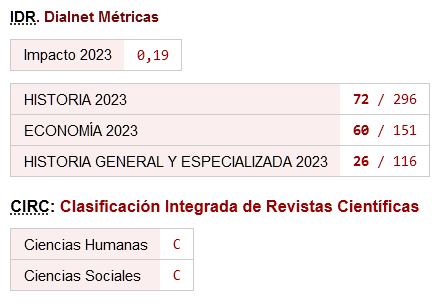A tale of two breweries, a city, a depression and a nationalist socialist regime -as told from annual accounts and the supervisory board report
DOI:
https://doi.org/10.26784/issn.1886-1881.v12i22.28Parole chiave:
Storytelling, Financial statement analysis, Supervisory board, BrewingAbstract
This paper presents storytelling as a useful research method in its own right, but also to scope out research projects. Construction of a story from archival accounting documents is undertaken. Using archival accounting data from two German breweries - Löwenbräu and Spaten - from 1929 to 1939, it constructs a story of the relatively complex business environment at the time. Only the financial statements and report of the Supervisory Board (Aufsichtsrat) are used. The story constructed is rich and reveals interesting reasons for the generally decreasing performance. This in turn raises several questions for further research into the two breweries. Arguably, without the construction of the story, such questions and areas of potential interest would not reveal themselves. The method described is useful for researchers to scope out research projects using accounting data and may also be useful for establishing context to accounting and business history studies.
Downloads
Riferimenti bibliografici
Armstrong, P. (2008). Calling out for more: comment on the future of interpretive accounting research. Critical Perspectives on Accounting, 19(8), 867-879. https://doi.org/10.1016/j.cpa.2007.02.010
Assél, A., & Huber, C. (2012). München und das Bier. Munich: Volk Verlag.
Avery, H. G. (1953). Accounting as a language. Accounting Review, 28(1), 83-87.
Belkaoui, A. (1978). Linguistic relativity in accounting. Accounting, Organizations and Society, 3(2), 97-104. https://doi.org/10.1016/0361-3682(78)90019-3
Bloomfield, R. J. (2008). Accounting as the language of business. Accounting Horizons, 22(4), 433- 436. https://doi.org/10.2308/acch.2008.22.4.433
Breton, G. (2009). From folk-tales to shareholder-tales: semiotics analysis of the annual report. Society and Business Review, 4(3), 187-201. https://doi.org/10.1108/17465680910994191
Bryman, A., & Bell, E. (2011). Business Research Methods. London: Oxford University Press.
Clarke, P. (2005). The story of Bernard F. Shields: the first professor of accountancy in the UK. Accounting History, 10(2), 103-123. https://doi.org/10.1177/103237320501000205
Czarniawska, B. (2004). Narratives in social science research. London: Sage. https://doi.org/10.4135/9781849209502
Damon, C. (2009). Constructing a narrative. In Potter, D. S. (Ed.), A companion to the Roman Empire (Vol. 32). London: John Wiley & Sons.
De Loo, I., Cooper, S., & Manochin, M. (2015). Enhancing the transparency of accounting research: the case of narrative analysis. Qualitative Research in Accounting and Management, 12(1), 34-54. https://doi.org/10.1108/QRAM-02-2013-0007
Evans, S. (2013). A thousand words? Accounting, Auditing & Accountability Journal, 26(4). https://doi.org/10.1108/aaaj.2013.05926daa.001
Fleischman, R. K., Mills, P. A., & Tyson, T. N. (1996). A theoretical primer for evaluating and conducting historical research in accounting. Accounting History, 1(1), 55-75.
https://doi.org/10.1177/103237329600100104
McAdams, D.P. (1993). The stories we live by: personal myths and the making of the self. New York: William C. Morrow and Co.
McKee, R. & Fryer, B. (2003). Storytelling that moves people. Harvard Business Review, 81(6), 51- 55.
McWatters, C. S., & Lemarchand, Y. (2013). Merchant networks and accounting discourse: the role of accounting transactions in network relations. Accounting History Review, 23(1), 49-83. https://doi.org/10.1080/21552851.2013.773632
McWatters, C. S., & Lemarchand, Y. (2010). Accounting as storytelling. Accounting, Auditing & Accountability Journal, 23(1), 14-54. https://doi.org/10.1108/09513571011010592
Hoffman, S., & Detzen, D. (2013). The regulation of asset valuation in Germany. Accounting History, 18(3), 367-389. https://doi.org/10.1177/1032373213492405
Jack, L. (2015). Future making in farm management accounting: The Australian "Blue Book". Accounting History, in press. https://doi.org/10.1177/1032373215579423
Lavoie, D. (1987). The accounting of interpretations and the interpretation of accounts: The communicative function of "the language of business". Accounting, Organizations and Society, 12(6), 579-604. https://doi.org/10.1016/0361-3682(87)90010-9
Lynd, S., Bahour, S. & Lynd, A. (Eds). 1994. Homeland: Oral Histories of Palestine and Palestinians. New York: Olive Branch Press.
Phillips, N. (1995) Telling organizational tales: On the role of narrative fiction in the study of organizations. Organization Studies, 16(4), 625-649. https://doi.org/10.1177/017084069501600408
Quinn, M. (2014) Stability and change in management accounting over time-A century or so of evidence from Guinness. Management Accounting Research, 25(1): 76-92. https://doi.org/10.1016/j.mar.2013.06.001
Schäder, C. (1999) Münchner Brauindustrie: 1871 1945 ; die wirtschaftsgeschichtliche Entwicklung eines Industriezweiges. Marburg: Tactum Verlag.
Spraakman, G. (2006). The impact of institutions on management accounting changes at the Hudson's Bay Company. Journal of Accounting and Organizational Change, 2(20), 101-122. https://doi.org/10.1108/18325910610675961
Vannini, A. (2009). Stories and Storytelling in Encyclopaedia of Communication Theory. Sage: Thousand Oaks, CA, 935-37.
Downloads
Pubblicato
Come citare
Fascicolo
Sezione
Licenza

Questo lavoro è fornito con la licenza Creative Commons Attribuzione - Non commerciale - Condividi allo stesso modo 4.0 Internazionale.










